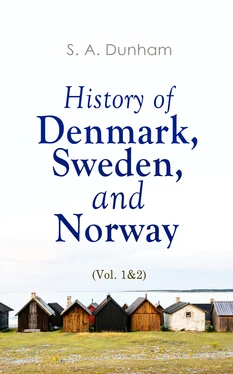After some great exploits in the east, to which his ardour, no less than his fear of Swibdager, bore him, Hadding returned to Scandinavia. In a sea-fight he defeated and slew his enemy, and thus became sovereign of Denmark, or, we should say, of the Danish islands—for Jutland and Scania obeyed different princes. Asmund, the son of Swibdager, he thus transformed into a foe, and a foe, too, greatly to be dreaded. In a battle which ensued, finding that the tide of success was against him, he silently invoked the aid of the wizard giant Wagnoft, the father of his deceased mistress, Hardgrip. Wagnoft obeyed the spell, and was immediately by his side. Asmund lost the battle, and fell; but in his last moments he had the satisfaction of knowing that he had rendered Hadding lame for life. And he had another kind of joy, dear enough to a pagan: his wife Gunhilda, disdaining to survive him, slew herself with his sword, and was laid in the same grave with him. An invasion of his own country by Uffo, the son of Asmund, prevented Hadding from pursuing his advantage; but the following spring he again invaded Sweden; but his ranks were thinned, alike, by famine and disease. His men were obliged to feed on their horses; next, on their dogs; and, lastly, on each other. To increase their consternation, a nocturnal voice assured them of great evils. The following night, even, another unknown voice threatened the Swedes with destruction. Both armies, therefore, were alarmed; each had a supernatural enemy, while each was perhaps unconscious that it had, also, a supernatural friend. That same night the two armies engaged; when, behold! two aged men, of a form larger than the human, were seen by the light of the stars in the battle—one for the Swedes, the other for the Danes. The latter were subdued, and their king glad to flee to his own country. But misfortune pursued him. One day, as he was cooling his limbs in the waters of the sea, he perceived a fish different from any that he had ever seen; as it was near the shore, he killed it, and it was taken to his camp. But what was his consternation when a sea-nymph appeared, and denounced direct vengeance on his head! He had killed one of the gods under the form of a fish. Henceforth the elements should be hostile to him; if he ventured on the deep, his vessel should be wrecked by the fury of the tempest; on land, the house which received him should, by a tempest, also be levelled with the ground; his flocks should perish in the fields; every place which he visited should be cursed for his sake: and this dreadful doom was to remain in force until he had propitiated the divine wrath by frequent sacrifices. The mandate was not to be despised; during the course of a year altars perpetually smoked with oxen immolated to Fro, the awful deity of the winds. [21]
The life of Hadding was full of portents and marvels. Scarcely had he rescued the princess Regnilda of Norway from the obligation of marrying a giant, by killing the monster, and making her his bride, than a most wonderful adventure befell him. One winter evening, as he was supping with his bride, a woman like a culler of simples was seen to raise her head from the ground close by the hearth, and inquired whether the king did not wish to know where such herbs grew at that season of the year. He replied, that he should very much wish to know. Hearing this, she enveloped him in his own mantle, and sank with him into the ground. What they saw in this subterranean journey bears some resemblance to the descriptions which have been given us of the Scandinavian world of spirits. They first entered a dark path, worn out by the feet of many travellers, and here they perceived some great ones of the earth—some in purple and gold—whose doom appeared to consist in their indefinite windings. Passing them, they entered a region of some fertility, whence the woman had derived her simples. Farther still, they reached a river of precipitate course and black waters, which rolled along the weapons of many heroes, and over which a bridge conducted them to a different region. One of the first objects that met their eyes was two armies engaged in deadly strife. “Who are these?” demanded Hadding. “These,” replied the sorceress, “are they who fell in battle; and it is their delight in this world continually to imitate their martial deeds in the other.” At length they reached a high wall, totally impassable. The woman, indeed, made no attempt to scale it; but, twisting off the head of a cock which she had brought with her, she threw it over; when, behold! the cock began to crow as if nothing had been done to it! Unable to proceed further, the adventurous travellers returned to the palace. [22]
The rest of this monarch’s life must be hastily despatched. He triumphed over Uffo, who fell in battle, and bestowed the vacant throne of Sweden on Hunding, brother of the deceased monarch. His last days were embittered by the unnatural conduct of his daughter Ulwilda, who, with her husband, planned his destruction. Though he escaped all the snares of his enemies, at length he laid violent hands upon himself, leaving the throne of Denmark, and the superiority over that of Sweden, to his eldest son, Frode I. [23]
Frode I. was also a great warrior, and he carried his depredations from Russia to the British islands, on which, unfortunately for the natives, he made a longer stay than kings, whose sole object was plunder, were accustomed to make. If there were any truth in the Danish account of this period, Scotland and South Britain were in frequent intercourse with the northern kingdom—sometimes for war and sometimes for peace. But these accounts are all to be distrusted. Events which happened at a much later period have been removed to the one before us; and the basis has been so much overlaid by fable, that no ingenuity can separate the true from the false.—When Frode commenced his reign, he found the treasury empty. How replenish it? By an expedient frequently to be found in Scandinavian legends. On a solitary island, a dragon, formidable alike for size and venom, brooded over immense riches. The youthful monarch hastened to the spot, entered the cave, fought and killed the serpent, and brought away the golden hoard. Whether there be any meaning in this and similar fables has been much disputed: probably, however, it had a foundation, and the dragon may have been some terrible pirate whom Frode destroyed, and whose subterraneous riches he seized. This unexpected supply, we are told, enabled him to pursue his expeditions on various coasts of Europe. But we have no inclination to follow him. We may, however, allude to the way in which he gained possession of London; because the same expedient is often to be found in northern writers. Despairing of the reduction of a place so well defended, he caused a report to be spread that he had suddenly died in his tent. Permission was asked to bury him in one of the temples of the city, and was granted. On the day appointed, the pretended corpse was borne through the gates; a great number of Danes attended to do honour to their monarch; but, under the garb of mourning, they hid their weapons of war; and, on a signal being given, they threw off the mockery of woe, assailed the Britons, and took the city by surprise. [24]
Of the immediate successors of this monarch little is known. Haldan , his son, was a great warrior, who put his own brother to death, and was hated by the people. Roe , the son of Haldan, was a quiet prince, mean in stature, but with a mind whose care it was to make his subjects happy. Helge [25], his brother and successor, with whom, during his own life, he had shared the throne, was also a prince of great qualities; but his vices were still greater. “Whether his lust or his tyranny were more intolerable,” says the historian, “is very doubtful.” His amours are too disgusting to be recorded. At length, seeing the execration in which he was held, he bade adieu to his country; and it proved a final adieu. According to report, he fell on his own sword. In the reigns of these princes, we have no mention of the Norwegian sovereigns; but those of Sweden—let us not forget that it is a Dane who writes—are represented as still dependent on Denmark. [26] Rolf (or Rollo) succeeded his father, and was much beloved by his subjects. [27]He fell through the treachery of a brother-in-law, who was excited to the deed by the sister of Rolf. Daughters conspiring against fathers, sisters against brothers, wives against husbands, are among the common events of Scandinavian history. As this prince died without issue, the Danish states elected for their monarch Hoder , a descendant of the famous Hadding, who had been educated by Gewar, a king of Norway. As it is in the reign of this latter monarch that Odin is again introduced on the stage of northern history—his first appearance being referred by Saxo to the time of Hadding—we can no longer refuse to notice what antiquity records with respect to him. In this, as in other parts of this introduction, the reader may admit or reject what he pleases. [28]
Читать дальше












